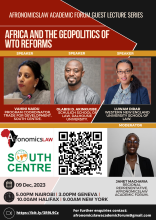Introduction to Symposium on Illicit Financial Flows and Sustainable Development in Africa
Contributors to the symposium offer unique perspectives and draw on different theoretical and methodological approaches to the practice and scholarship related to IFFs in African states and beyond. Several themes were addressed by the contributors, including tax justice, technology, corruption, accountability, political will, repatriation, recovery of Assets, migration, whistleblowing, international investment, and real estate.

